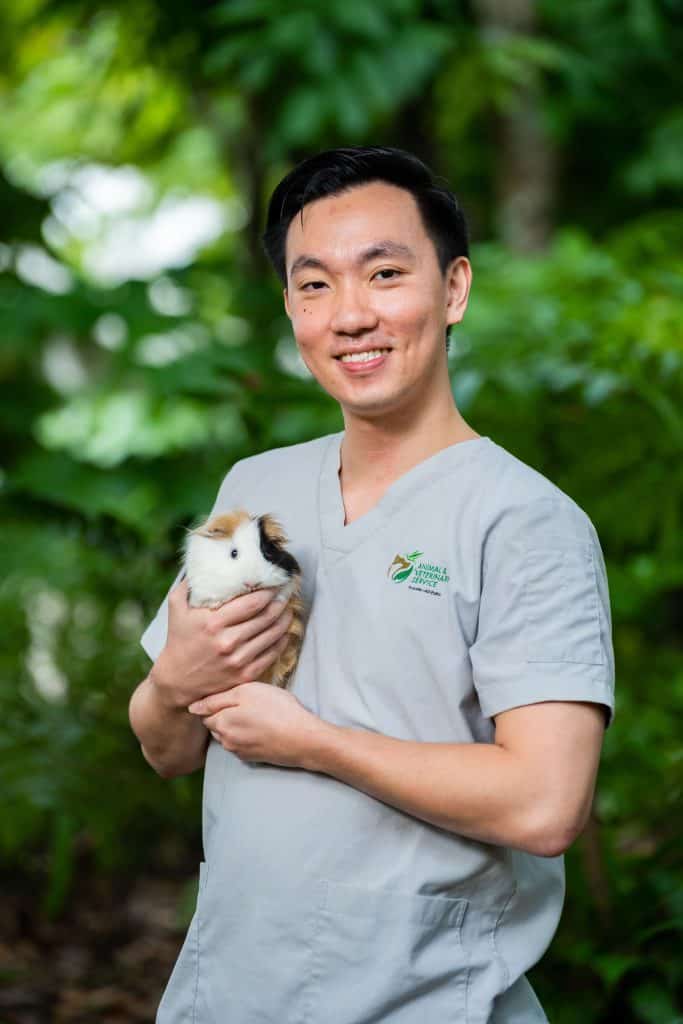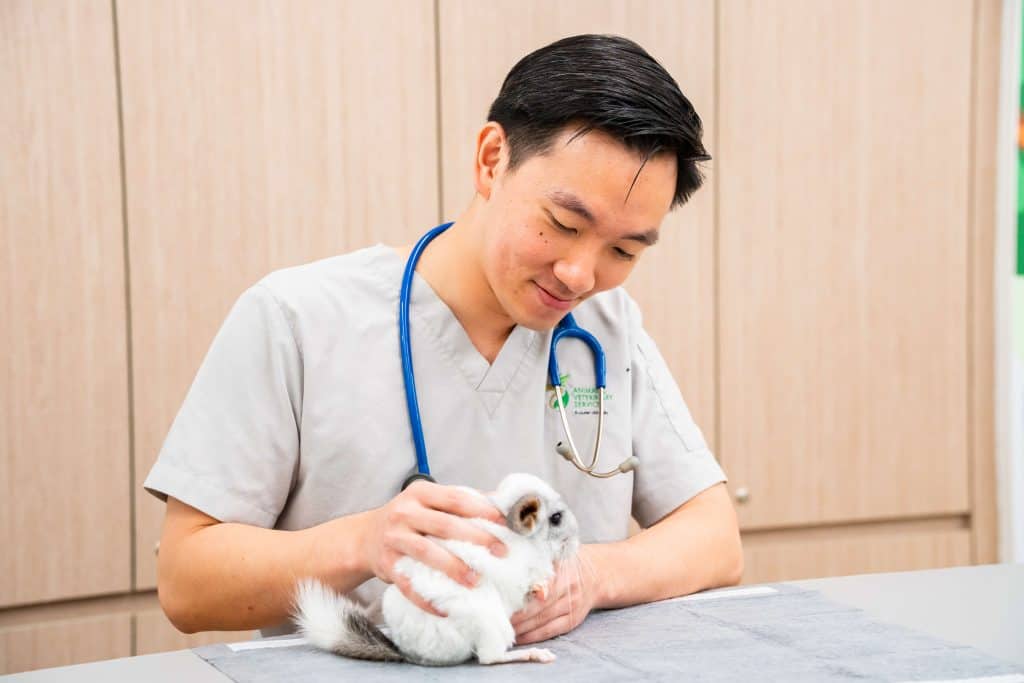Get a glimpse into the career of Dr Ian Liang, a dedicated veterinarian leading in One Health advocacy and animal rehabilitation at the National Parks Board (NParks). From a lambing stint to rabies scare, the NParks Scholar shares intriguing stories from his undergraduate days. Continue reading to discover the profound impact a veterinarian can make on both animal well-being and public health.
Turning Childhood Dream into Reality
I have always had a strong interest in animals and the natural world since I was a child. I would spend my school recess breaks and weekends looking for insects and other “creepy crawlies”. Animals fascinated me, and I wanted to learn all about them, how their bodies worked, why they behaved the way they did, and how to treat them. As such, it was very natural that I decided, at the age of 12, to become a veterinarian. Since then, I have come to realise that treating animals is only one part of a veterinarian’s job. Veterinarians hold many roles, from ensuring food safety and upholding animal welfare standards to controlling and preventing zoonotic disease and safeguarding public health.
I was thus inspired to apply for a scholarship with the then Agri-food and Veterinary Authority of Singapore (AVA)*, and was lucky to be awarded the scholarship to further my studies in veterinary medicine abroad at the University of Edinburgh.
Wild Encounters: From Lambing Fields to Rabies Scare
Being awarded the scholarship afforded me the opportunity to study at one of the best veterinary schools in the world and work side by side with some of the leading figures in veterinary medicine. I spent the next five years living in Edinburgh, a beautiful city replete with amazing architecture and scenery within a 30-minute drive. As part of my course, I had the opportunity to take on various husbandry and clinical placements.
One of my more memorable placements was at a sheep farm in Northumberland. It was lambing season then—when sheep give birth. Just like us humans, the sheep sometimes require a helping hand to deliver their lambs, and that was where we came in. My friend and I spent three weeks living on the farm and assisting with the delivery of lambs for sheep who had difficulties. It was back-breaking work. We worked from 6 am to 7 pm every day and were on night shift every other day, waking up every 2 hours to make sure the sheep were alright. However, holding the newborn lambs in our arms and seeing them learn to eventually stand up and suckle made it all worthwhile in the end. It was a very different way of living from what I was accustomed to, but it was one that I enjoyed, nonetheless. It also made me realise how hard farming was and how much work it involved. I developed a newfound respect for farmers and their families after that placement.
Another memorable experience was when I found a bat in a corner of a shed during one of my placements at an equine hospital in the US. I had picked it up to examine it before putting it back and leaving it alone, not thinking much about it. It was only after my placement, when one of the vets at the hospital called me after learning about the bat, that I remembered that bats can be carriers of Rabies—a deadly disease spread by animal bites. Although I had not been bitten (or at least I did not think so), out of precaution, I was checked into a local hospital where I spent 6 hours waiting at the A&E department to get my rabies post-exposure prophylaxis treatment. Looking back, it was not the wisest of decisions to pick a bat up, but it served as a reminder of how interconnected animals are with humans and that zoonotic diseases can spillover from animals into the human population.
Doing Good Work: One Health Advocacy & Animal Rehabilitation
As fate would have it, when I finished my studies and started work, I was nominated to be part of the One Health Secretariat for NParks, where I was involved in One Health-related work encompassing zoonotic diseases like Rabies. One Health is an approach that recognises that the health of humans is closely connected to the health of animals and our shared environment. In recent times, especially due to the COVID-19 pandemic, One Health has gained more importance and attention. My role as part of the One Health Secretariat gave me the opportunity to work closely with other agencies like the Ministry of Health (MOH), National Environment Agency (NEA), Singapore Food Agency (SFA) and Public Utilities Board (PUB), on One Health matters. I also had the opportunity to attend overseas workshops like the Asia-Pacific Quadripartite One Health Workshop, where I met delegates from other countries and learnt how other countries implemented the One Health approach. Vets play an indispensable role in safeguarding public health and detecting and preventing zoonotic disease spillover. Working at NParks has allowed me to put on the hat of a public health veterinarian and given me opportunities that would have been otherwise hard to come by for a veterinarian working at a private clinic.

My first posting after graduation was to AVS’ Centre for Animal Rehabilitation, Singapore’s first facility dedicated to animal behavioural rehabilitation, where I currently work as a shelter veterinarian. As part of my core work, I oversee the health, medical treatment, and preventative healthcare programmes of the animals housed at the centre. I am part of a team of dedicated shelter managers and officers who run the shelter, ensuring that the animals receive the necessary care and medical attention during their stay there.
I also work closely with our rehabilitation team that runs the centre’s canine behavioural rehabilitation programme. We take a science-based and welfare-considered approach to animal training to support the rehabilitation and rehoming of free-roaming dogs as part of efforts to integrate them more successfully into the community. Our rehabilitation team develops and implements behavioural modification programmes that rely on rewards-based training methods to achieve behavioural change without compromising animal welfare. The job is a tiring but fulfilling one, and I am proud to be part of such a dedicated team of colleagues, doing good work and helping our free-roaming animals find homes and integrate better into our community.
A Scholar’s Advice: On Passion, Courage, Meaning, and Experience
My advice to students exploring scholarship options would be to follow your passion and not be afraid to take the time to explore where your interests lie. Doing internships and placements can give you invaluable experience and help you decide if a career path is one you would like to embark on.
If you join NParks, you will have the opportunity to make a positive difference in the lives of countless animals through sound, evidence-based policymaking and hands-on work in animal management.
*AVA was dissolved effective in 2019. All animal and veterinary functions now come under the purview of the Animal & Veterinary Service, a cluster under NParks.
DR IAN LIANG
NParks Overseas Undergraduate Scholarship
Bachelor of Veterinary Medicine & Surgery with Honours (Distinction), University of Edinburgh, United Kingdom
Now: Veterinarian, Centre for Animal Rehabilitation
From: Hwa Chong Institution

